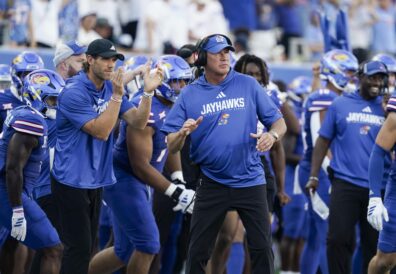When Lance Leipold was a graduate assistant at Wisconsin in 1993, the Badgers faced Michigan State in Tokyo in the Coca-Coca Classic; when Leipold was head coach at Buffalo in 2019, the Bulls took on Charlotte in the Bahamas Bowl.
“Guys on that team talk about those experiences for the rest of their lives,” Leipold said on Monday.
The KU coach said the opportunity to create such memorable moments for players, as well as the chance to promote the sport more broadly, serve as some of the primary motivating factors behind playing college football games overseas.
It’s a discussion in which KU finds itself specifically enmeshed recently because the program is currently in talks to face Arizona State at London’s Wembley Stadium in 2026, as was widely reported on Thursday.
Leipold said he couldn’t offer an official comment on the prospect of that particular game — the so-called Union Jack Classic — because conversations are still in progress: “It’s kind of talked about. That’s out of my hands at this point of where that’s going.” (In fact, both KU and ASU have nonconference games currently scheduled for the date in question, Sept. 19, 2026.)
But Leipold took the time to explain generally why playing in such a game could be an appealing prospect for the Jayhawks. He equated it with the foreign tours that other college sports teams get to take over the summer, and the value those can provide for student-athletes.
“I think these are great lifelong experiences,” Leipold said, “and I know as this game continues to evolve into a heavy business model, I do still think we have life experiences and educational opportunities, that if they do present themselves that we need to look wholeheartedly into them.”
At the same time, he also acknowledged a commercial purpose more in line with, as he put it, the “professional model” into which college football is steadily evolving: “There’s a reason why the NFL keeps playing more and more games in other countries. It’s expanding. It’s growing.”
“You’re going to see other avenues open up for other opportunities to promote, whether it be college football as a whole or the Big 12 itself,” he added.
KU could have the chance to do just that next fall while also spreading the Jayhawk brand in particular across the Atlantic. Indeed, if the program is able to lock down the game, it would become one of the first Division I Football Bowl Subdivision teams ever to play in the United Kingdom, and the first college football teams of any kind since 1988.
“And if it does work out that we end up in an opportunity to do that and to be one of the first ones, I think, (it) is an exciting opportunity, but we shall see,” Leipold said.
